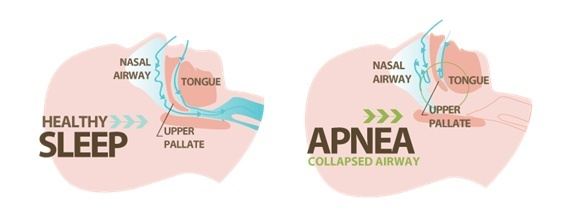Sleep disordered breathing (SDB) refers to all conditions that are a result of altered breathing during sleep. Some of the conditions that fall under SDB are snoring, upper airway resistance, frequent arousal, restless leg syndrome, periodic limb movement, parasomnias (night terrors, sleep walking, sleep paralysis, etc.) and others. One does not have to have apnea to have a sleep / airway problem.

IS SNORING OR SLEEP APNEA KEEPING YOU AWAKE AT NIGHT?
Studies show that as many as 70% of snorers have Obstructive Sleep Apnea. This is a serious medical condition that stresses the heart and increases your chance of stroke and other health problems. Each time snorer awakens during sleep, the heart is stressed. Its comparable to waking up with an adrenaline rush. Enough of these events can decrease blood oxygen levels up to 60%, which can cause fatigue, unstable mood and even brain cell death.
Snoring
Is a sound resulting from turbulent airflow that causes the tissues of the nose and throat to vibrate during sleep. The turbulent airflow is related to a narrowing at some point in the nose, mouth or throat.
“Laugh and the world laughs at you, Snore and sleep alone.” -Anthony Burgess
Obstructive Sleep Apnea (OSA)
is a common disorder in which you have one or more pause in breathing or shallow breaths while you sleep. Breathing pauses can last for a few seconds to minutes. They may occur 30 times or more an hour. Typically, normal breathing then starts again, sometimes with a loud snort or choking sound.
Upper Airway Resistance Syndrome (UARS)
is a common sleep disorder characterized by the narrowing of the airway that can cause disruptions to sleep. The primary symptoms include excessive fatigue and chronic insomnia.
Epworth Sleepiness Scale
The Epworth Sleepiness Scale is widely used in the field of sleep medicine as a subjective measure of a patient’s sleepiness. The test is a list of eight situations in which you rate your tendency to become sleepy on a scale of 0, no chance of dozing, to 3, severe change of dozing. When you finish the test, add the values of your responses. Your total score is based on a scale 0-24. The scale estimates whether you are experiencing excessive daytime sleepiness that possibly requires medical attention.
Click on the Patient Screening link to see if you have Excessive Daytime Sleepiness.
Associated Medical Conditions
- High Blood Pressure
- Heart Disease
- Diabetes Type II
- Stroke
- Heart Attack
- Erectile Dysfunction
Signs & Symptoms
- Excessive daytime sleepiness
- Snoring
- Insomnia
- Clenching, grinding
- Morning headaches
- Poor concentration, forgetfulness
- Depression, irritability, anxiety
- Inability to lose weight, Excessive weight gain

